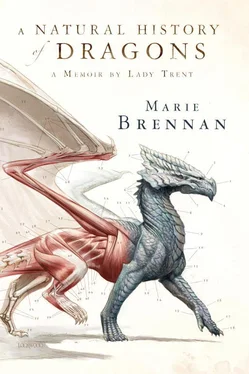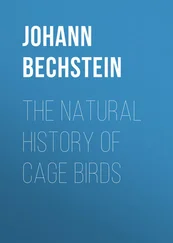Lord Hilford had tried to coach us on the journey regarding the subtleties of Bulskoi names, but it still took me a moment to realize that “Rusha” must be our guide, Ledinsky—a diminutive of “Ruvin.” He gestured for Dagmira and Iljish to follow him. In the meanwhile, two of Khirzoff’s men hurried to open the doors of the lodge, and those of our party who were not servants went inside.
We were shown to our rooms—one apiece for the earl and Mr. Wilker, and a shared room for myself and Jacob. The chief extravagance of this place seemed to be the abundance of chambers, and the willingness to squander wood in heating them; our bed was certainly an improvement over our accomodation in Gritelkin’s house, but nothing on the comforts of a Scirling mattress, and the decorations were scanty. The serving boy who brought up a basin of water spoke no Chiavoran, and either lacked equally in Vystrani or was afraid of me; he just shrugged at my question about Dagmira and hurried out of the room.
“Why do you want her?” Jacob asked, once we were alone. “I thought you detested the girl.”
“Less than I used to, and besides, it’s a friendly sort of detestation,” I said. “It’s just—” I lowered my voice. Inside, the lodge was less charmingly rustic, more grim and dark. I had, at Manda Lewis’s insistence, once read The Terrible Thirst of Var Kolak. The terribleness of that novel lies more in the overwrought prose than the monster Var Kolak, but standing in this place, I understood at last what had inspired Mr. Wallace’s pen. “We have few enough friends in this place, and I don’t think Khirzoff is one of them.”
I expected Jacob to chide me out of that view; it was easy to imagine my uneasiness a simple fancy, brought on by the isolation. But Jacob nodded, and answered in the same low tone. “We may be his guests, but I don’t think we’re welcome. The question is, why did he invite us here?”
I had no answer. We washed our faces in the cold water and went down for supper with the boyar. Gaetano Rossi was not present, and after the first course had been laid—a style of service which, I reflected, we had acquired from the Bulskoi in the first place—Lord Hilford asked after the man.
“He is occupied with his work,” Khirzoff said, attacking his soup as if he, not we, had been riding for three days.
“Work?” Lord Hilford repeated, with an inquiring tone. “He is not here for leisure, then?”
Was it my imagination, or did Khirzoff hesitate? It might only have been that the slice of beet in his spoon was too large and overbalanced back into the bowl. He cut it with the edge of the spoon and said, “Leisure, yes, but we have been hunting. The preservation of our trophies is his task.”
The conversation went on to bear, wolf, and other game, while I listened in silence. A young lady, of course, could not be expected to take much interest in such talk, but in truth I was glad for the chance to observe. Khirzoff’s friendliness and good cheer was distinctly forced, I thought. It might be explained away by saying his razesh had not warned him sufficiently about us; now the boyar felt obligated to play host, against his own wishes. But my uneasiness grew.
Khirzoff did pause long enough to assure us that this was not the promised feast; that would come the following night. I wondered if it would be an improvement over what we faced now. Our dishes were odd, as if the cook were trying too hard, or unsure of his work. He did not stint on expensive spices—I could not even recognize some of them—but the application was peculiar and sometimes less than successful, as with the venison dyed a most off-putting shade by aggressive use of turmeric. I left most of it on my plate, politeness be damned.
Lord Hilford did tell the boyar of our “supernatural” difficulties in Drustanev, and their source. “You say the lad ran?” Khirzoff said, and frowned through his beard. “My men will hunt him down. Or he will go back to his village; either way, we will find him.”
I was hardly well-disposed toward Astimir after everything he had done to disrupt our work, but I found myself hoping the young man was not taken up by Khirzoff’s followers. It sounded as if his punishment might be harsher than I would wish.
From his seat across the table from me, Jacob said, “I suppose there hasn’t been time yet to find traces of Jindrik Gritelkin.”
He could count the days as well as I could; the boyar’s men could scarcely have returned yet, even if they found the man almost immediately. Ledinsky must have been sent to Drustanev practically on Lord Hilford’s heels. No, I thought—my husband had spoken simply to watch Khirzoff’s reaction.
The man’s lips thinned inside his beard. “No, there has not.”
Gritelkin was supposed to be this man’s agent. Even if his primary duty was to collect the village taxes twice a year—which was the description Lord Hilford had given of a razesh—surely his title meant something. “I’m astonished the villagers did not send to you when Gritelkin went missing.”
The boyar snorted, picking up his glass of wine. “Likely they got drunk in celebration. They hate Gritelkin there, you know. The razeshi are rarely liked, but every time he came to me with the taxes, more complaints.”
By the expressions around the table, my companions’ thoughts were the same as mine. We had heard nothing of such conflict, and yet, it explained a great deal—including the general miasma of hostility that had surrounded us since our first moments in Drustanev. Living in the house of the hated razesh, expecting him to be our local guide, must have tarred us with his brush.
I wondered how much of that had been due to Gritelkin himself. As I had told the men, village gossip had made it clear that Khirzoff himself was not much liked, either. Few of the Vystrani boyars were; they were Bulskoi interlopers, reminders of Vystrana’s subject status. But Khirzoff made no attempt to hide his own disdain for the villagers of Drustanev. Everything about his establishment, even here at this summer hunting lodge, was Bulskoi, with no concessions to local habits.
Gritelkin, though… his was a Vystrani name. How did that figure into this web of tension?
“We will speak more of it tomorrow,” Khirzoff said, rising from the table. “And also of what you have been doing here, this research of yours. The servants will show you to your rooms.”
He did not even offer brandy as an after-meal courtesy. Lord Hilford murmured to Jacob and Mr. Wilker, “I have some in my pack,” and the men went off to cleanse their palates.
I found Dagmira in my room, turning down the covers, scowling fit to light the bed on fire. I had meant to ask her for sooner, but everything from the mob onward had distracted me. I wondered how badly I would regret that delay. “Tell me about Gritelkin. Your people don’t like him, I’m told.”
I received a glare of the sort that told me I was prying into village business, where I did not belong; but Dagmira answered me nonetheless. “Why should we?” she muttered, keeping her voice low, as if she, too, felt the oppressive weight of this place. “He made himself the boyar’s creature. Too much reading put ideas in his head; he said it would be better for Drustanev if he was razesh. But he was just as bad as the one before him.”
I worked through this with lamentable slowness, hearing what she did not say. “Was Gritelkin born in Drustanev?”
“Of course,” she said, once again filled with scorn for my ignorance.
Had Lord Hilford ever mentioned that? He’d called Drustanev Gritelkin’s village, but I had assumed the association a political one. A Vystrani man, somehow positioning himself as the boyar’s administrator, with grand dreams of benefiting his village. It made sense; a local man would be more sensitive to local issues, more willing to advocate on their behalf to the foreign overlord. But it had done no good—no wonder, with Khirzoff as he was—and worse, it had rebounded to ill; the people of Drustanev felt betrayed by his failure. It was truly unfortunate that Lord Hilford had chosen this of all places to conduct our research.
Читать дальше












